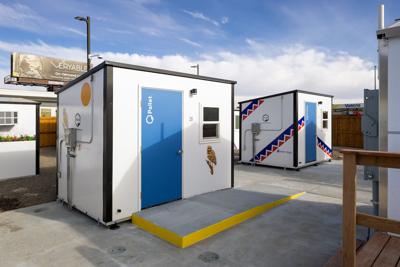Rapid-response shelter village manufacturer Pallet Shelter has been named an award recipient of Gov. Gavin Newson’s $1 billion homelessness funding, a program that includes delivering 1,200 small homes to California cities, following the release of its new Series 2 living spaces. Pallet CEO Amy King said that these homes, containing features like a mono-pitch roof, smooth exterior and interior panels, were designed by people with lived experience in homelessness.
“The vast majority of our staff are people who have exited homelessness or are actively exiting homelessness now, and people who are exiting the justice system or recovering from addiction,” King said. “We have a lot of that individualized experience that heavily informs the design of our shelters. … We also provide something that’s very interim in nature with wraparound services and support for people to succeed.”
According to King, Pallet’s mission is to create a rapid, safe and cost-effective response to the homelessness crisis in places like LA, where the company currently operates at 13 sites across the city and has supported 465 people through substance abuse, 599 people with mental health grants and 721 people with employment referrals. Homelessness crime rates have reportedly dropped nearly 25% within a quarter-mile radius of Pallet shelter villages.
“A lot of progress is being made by Mayor Bass and the administration here, but there’s still a lot more need for interim solutions,” King said. “People are sleeping outside. It’s intense and it’s not safe, healthy or a good option for people. … We really want to help provide a cost-effective solution that preserves as much resources as possible for permanent housing because that ultimately is the solution, but we know it’s going to take a very long time and we cannot build our way out of this (crisis).”
Pallet’s new shelters are the 70-square-foot Sleeper and 120-square-foot EnSuite, which includes in-unit hygiene facilities. The designs were informed by feedback from residents of the over 120 Pallet shelter communities across the United States.
“We have improved safety ratings, we have dramatically improved energy efficiency, which is really important for the city, and improved insulation,” King said. “We now have a product with an in-unit bathroom. We provide bathrooms at all of our sites in a communal setting, but now there’s a private bathroom, so we’re really excited about that.”
Including its LA locations, Pallet has built over 4,000 shelters in more than 86 cities and 24 states. King said that residents typically stay an average of three to six months, and that their ability to have safe access to the same place each night allows them to rehabilitate faster. Stable living locations provide spaces for storing personal items and receiving mail. They also help residents to be located by service providers or apply for jobs.
“People that are experiencing homelessness, especially those that are chronically homeless, don’t want to go to congregate shelters for obvious reasons,” King said. “Congregate shelters are traumatizing; they’re concerned about health and safety. (Pallet) allows people to have their own space. It allows them to bring their pet with them, to stay with their partner if they choose and bring their things. … We always set them up in a community setting, so they’re getting services, but on their terms.
“We’re seeing as high as 60% placement rates out of our sites into permanent housing. We’re seeing upwards of 40% family reunification rates, so lots of people that are going home are able to rehabilitate to the extent that they can build those bridges back to family.”
King said that her hope for the future is that Pallet continues to serve as a model showing the impact that transitional housing can have on people’s lives. She added that the company is also looking to expand its services for migrant populations, refugees and people displaced by natural disasters around the world.
“I hope that, within my lifetime, I will not have any more Pallet shelters to ship out for domestic homelessness,” King said. “Ultimately, we want to get people stabilized and ready for permanent housing. We go to D.C. all the time and work in states as well to advocate for more permanent housing supply because without permanent housing, what’s the point of this? People need a place to go. This is not a substitute for permanent housing, so we need a through line for people to go to and hopefully there’ll eventually be enough of that housing for everyone and we won’t be needed anymore.”
Pallet Shelter
425-407-5740, www.palletshelter.com

